Are you ready for an album themed around the solar system? Are you ready for allegories of some of life’s deepest topics including love, war and fatherhood? Are you ready for colossal orchestral strings and titanic cosmic synthesizers?
Opening track ‘Neptune’ eases the listener in with some
gliding falsettos from singer-songwriter Sufjan Stevens over some delicate
pianos. Classical orchestration courtesy of Nico Muhly then joins the palette
for a first taste of the grandiosity to come. However, it’s ‘Jupiter’ with its
distorted drums courtesy of James McAlister, fluttering guitars courtesy of
Bryce Dessner and huge horns from Nico Muhly that launches the album through
the stratosphere into a place of no sonic bounds – a place that the album
continues to explore for its duration.
Planetarium could
never be accused of not being ambitious. If anything it’s completely
ostentatious and overblown. But there’s a nerdy charm to its intergalactic
contents, helped by the fact that it all sounds absolutely gorgeous.
Okay, maybe gorgeous isn’t true for all of it. There are
parts of the album you’ll spend clawing onto some semblance of melody or beat
(as on ‘Mars’). And whilst Sufjan through a Daft Punk-esque vocoder sounds cool,
Sufjan on auto-tune feels like a step too far (he reminds me of ‘Owl City’).
 |
| Me listening to 'Mars' |
But, of course, all of this contributes to the album’s theme
of space. Honestly, what space-themed LP would be complete without robo-vocals?
As for the musical passages that collapse into dissonance, they serve only as a
reminder of how overwhelmingly unfathomable the universe is, too unfathomable
to be summed up by our human construct of melody (in the case of ‘Mars’, the
dissonance also seems to aptly symbolise the chaos of war – Mars being the god
of war).
Not all of the tracklist appears to be arranged in the most
sensible way, which damages the flow of the album. Ambient instrumentals ‘Black
Energy’, ‘Sun’ and ‘Tides’ are lumped together instead of separated by songs,
which only seems to form a napworthy lull in the middle of the album. Other tracks
meanwhile cut out abruptly at the end when they could have neatly segued into
the next track.
Fortunately, for the most part, each singular track flows
well. And all musicians seem to be in good form. The
classical instrumentation of Nico Muhly feels cinematic enough to eat popcorn to. Sufjan’s vocals,
whilst sparse and chorus-less, are still enunciated in a way that’s catchy
enough to hum on repeat listens, whilst his lyrics are as poetic as ever. Bryce
Dessner’s effervescent guitar playing meanwhile fits in perfectly, even if I’ve
never been a fan of his band The National. Even drummer James McAlister, of
whom I’m not familiar with, proves his worth with a diverse mix of raw and
electronic percussion.
Will this supergroup live to make another album? It’s hard
to say where they can go from here, but hopefully they may be able to improve
the flow whilst maintaining their creative and emotive musicianship. If this is
only a novelty project, then it’s still a memorable project for being as
brilliant bombastic as it is.
★★★★☆
TRACK TASTER:
